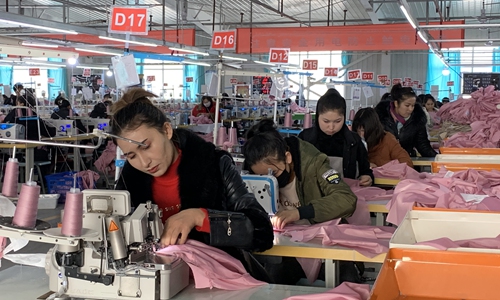HOME >> BUSINESS
Trade war takes toll, but Xinjiang exporters seek to diversify markets
By Li Xuanmin in Aksu Source:Global Times Published: 2019/11/20 21:43:40
Trade war takes toll, but exporters seek to diversify markets

A view of a clothing manufacturing plant of Xinjiang Jinliyuan Clothing Co in Aksu, Northwest China's Xinjiang Uyghur Autonomous Region on Wednesday Photo: Li Xuanmin/GT
Textile companies in Aksu, the nation's largest top cotton production base in Northwest China's Xinjiang Uyghur Autonomous Region, are seeing their exports to the US fall to almost nothing this year amid a bickering trade war between the world's two largest economies.
While some have dubbed this year as the hardest for foreign trade, those textile companies have been actively moving into domestic markets, markets along the routes of the Belt and Road Initiative (BRI) and European countries to fill gaps left by US clients.
With government support policies and logistics subsidies, the local manufacturers are confident of their business prospects, believing that sunshine always follows the storm and their business will recover soon with the diversification of export destinations.
At Aksu Textile Industrial Park, Xinjiang's largest textile industrial park - home to hundreds of manufacturers - trade volume of textiles, cotton yarn, clothes and hats plunged 86 percent to $35.87 million in the first 10 months of 2019, according to the industrial park's committee manager Liu Jizhong.
"Our exports to the US dropped to near zero amid the trade war, which weighed on the overall foreign trade volume. The escalating trade war has dragged down the industrial park's output by about 40 percent," Liu told the Global Times on Wednesday, pointing to tons of clothes in the park's warehouse due to lackluster overseas demand.
Last year, the industrial park exported 5 million garments, mostly to the US.
The US levied an additional tariff of 10 percent on $300 billion of Chinese imports on September 1, which reportedly covers 87 percent of textiles and clothing from China. It is not clear whether Washington will impose an additional 15 percent tariff on $156 billion of Chinese products, including clothes and toys, on December 15.
The tariff hike is taking a bite on the business of Xinjiang Jinliyuan Clothing Co, a local textile manufacturer located in the park. Zhang Jie, general manager of Jinliyuan, told the Global Times on Wednesday that the company's clothing exports to the US had halted this year, including to its largest overseas clients Disney, which accounts for 30 percent of its foreign trade transactions.
About 70 percent of Jinliyuan's income originates from foreign trade, of which the US used to be the producer's largest export market.
"This is the hardest year for textile companies specializing in foreign trade. We signed a 10-million-yuan ($1.42 million) initial agreement with Disney in March and then sourced fabrics for the order in bulk. But Disney called off the deal in May and we have no choice but to stock materials in the warehouse, exposing them to the dust," Zhang said.
Last year, Zhang's company expanded its capacity by 24 production lines to 72 on expectations of soaring demand overseas. But now the new lines are idle, Zhang said.
What's worse is that as demand slid to a crawl, the company had to lay off some employees or ask some to take a short holiday to cut costs, he said.
Now, Jinliyuan employs 900 workers, most of whom are Uyghur.
Export diversification
Despite the economic loss, major producers at the industrial park are displaying a palpable level of calm and confidence in the future - just like the weather in Aksu on Wednesday, which cleared up after a sandstorm in the morning.
Efforts to diversify markets and reduce reliance on the US are in progress.
"We have good developments coming one after another. Our chairman has reached an intention to cooperate with Russian retailers. German clothing companies also signed a deal with us. We have begun the design process, and shipments will start next year," Zhang said.
Orders to the industrial park are also surging from Europe, Southeast Asian and BRI countries, according to Liu, who urged local textile companies to take advantage of Xinjiang's geographic position as a gateway to Central Asian countries such as Kazakhstan and Kyrgyzstan.
In September, the Xinjiang government announced favorable policies that aim to subsidize transportation costs for southern Xinjiang manufacturers, including those in Aksu. Companies no longer need to pay railway costs from Aksu station to Urumqi, the capital city. They will also be able to get a 50 percent discount for shipments from Urumqi to stations abroad.
"We're mulling over more policies to help local companies contain costs and guide them into neighboring markets," Kahaerjiang Kuerban, an official of Aksu's foreign trade bureau, told the Global Times on Wednesday.
Shifting to the domestic market is another choice. Domestically, Jinliyuan has set up a children's wear brand Ayoryor, targeting markets in eastern and central China.
Foreseeing potential business opportunities at home and abroad, Liu said it will certainly take some time for the foreign orders to bounce back, but the future is of great potential and promising.
Newspaper headline: Xinjiang textile exports to US dry up
Posted in: ECONOMY